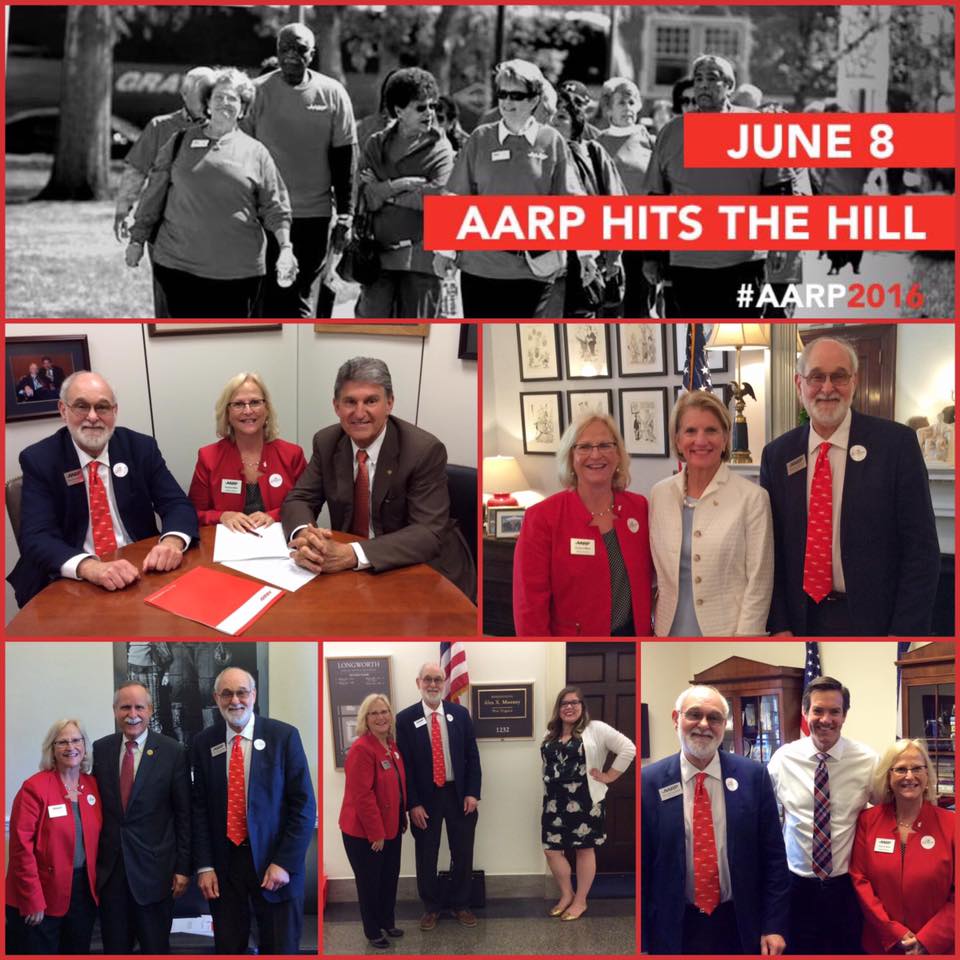AARP Hearing Center
AARP staff and volunteers from West Virginia and across the nation converged in Washington on June 8th to advocate on behalf of AARP members and all older Americans on the crucial issues of Family Caregiving and Social Security.

The issues that AARP West Virginia leaders raised with West Virginia’s Congressional Delegation included:
Family Caregiving Resources and Supports: In West Virginia, nearly 300,000 family caregivers provide unpaid care valued at $2.8 billion annually. In recent years, about 40 million family caregivers in the nation have provided unpaid care valued at $470 billion annually, more than total Medicaid spending. Family caregivers also help delay or prevent more costly institutional care and unnecessary hospitalizations, saving taxpayer dollars. They help with daily activities including bathing, dressing, meal preparation, managing medications and transportation.
AARP advocates are asking members of Congress to support two pieces of bipartisan legislation to help family caregivers, the Recognize, Assist, Include, Support and Engage (RAISE) Family Caregivers Act, and the Credit for Caring Act, and are also enlisting members of the House and Senate to join the bipartisan Assisting Caregivers Today (ACT) Caucus.
The bipartisan RAISE Family Caregivers Act would require the development of a national strategy to support family caregivers. The legislation has already passed in the U.S. Senate, and the House bill has more than 60 cosponsors. AARP is urging the House to pass the legislation.
The bipartisan Credit for Caring Act would provide a federal tax credit for eligible working family caregivers caring for loved ones of all ages. Additionally, the congressional ACT Caucus serves as a forum to engage members of the House and Senate on family caregiving and living independently, exchange ideas, and build bipartisan relationships that can lead to solutions.
“Caregiving is an ageless, nonpartisan issue that is growing in importance. Most of us have been or will be a family caregiver, or will need help to live independently,” said Gaylene Miller, AARP West Virginia State Director. “With family caregivers making up the backbone of services, we must leverage more private and public sector solutions that help support those who provide care and the people they care for.”
Social Security: In West Virginia and across the nation, AARP has been a long-time champion of Social Security. AARP’s proactive work to ensure Social Security’s Trust Fund solvency and adequate benefits continues on this day of issue advocacy on Capitol Hill.
On this important issue, AARP advocates will continue to promote a dialogue about what we can do together to bring about legislative action in the near future to ensure Social Security is financially sound and provides adequate benefits for future generations. To help spur that dialogue going forward, AARP has shared its principles for Social Security adequacy and solvency with members of Congress.
And, separate from advocating in Congress, as the election unfolds AARP West Virginia volunteers will seek to engage all candidates running for federal office, including those running for President and Congress, on the issue of ensuring that Social Security solvency and adequacy for current and future generations.
“Social Security remains a key issue for AARP members and older Americans,” said Rich Stonestreet, AARP West Virginia State President. “Anyone running for office this year owes it to the voters to tell them if they plan to work toward solving the issues that impact Social Security’s future.”
For photos and more information on from AARP West Virginia's June, 2016 Capitol Hill meetings, visit AARP West Virginia’s social media channels at www.facebook.com/AARPWestVirginia and www.twitter.com/AARPWV.































































